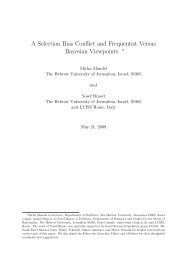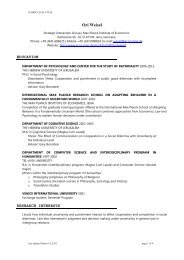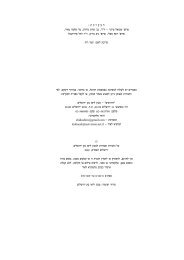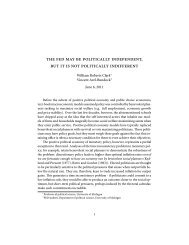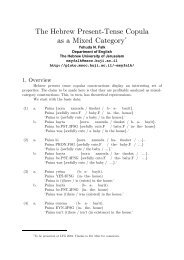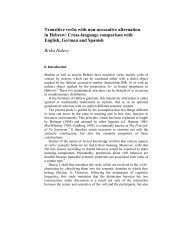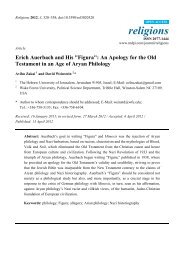PRO Theorem - Pluto Huji Ac Il
PRO Theorem - Pluto Huji Ac Il
PRO Theorem - Pluto Huji Ac Il
Create successful ePaper yourself
Turn your PDF publications into a flip-book with our unique Google optimized e-Paper software.
SYNTACTIC THEORY Y. N. Falk<br />
:<<br />
>ROY\OW¡ Z¢<br />
7K£ 3UREOHPV<br />
/ What is the status of <strong>PRO</strong> in terms of Binding Theory? In some ways it resembles a<br />
pronoun, but in other ways it resembles a reflexive (anaphor).<br />
Pronoun-like properties of <strong>PRO</strong>:<br />
Can be coreferential with non-c-commanding antecedent<br />
[<strong>PRO</strong> i to clone dinosaurs] would please the geneticist i.<br />
Can have “arbitrary” reference (like the pronoun one)<br />
[<strong>PRO</strong> arb to clone dinosaurs] would be a major scientific advance.<br />
Can refer to something in the discourse<br />
The geneticist i was depressed. [<strong>PRO</strong> i to clone dinosaurs] would<br />
have been really impressive.<br />
Anaphor-like properties of <strong>PRO</strong><br />
Coreference is often obligatory.<br />
The geneticist i wishes [<strong>PRO</strong> i/*j to clone dinosaurs].<br />
Antecedent has to be “local”<br />
The geneticist i claims [that the movie producer j wishes [<strong>PRO</strong> j/*i to<br />
clone dinosaurs]].<br />
/ Why is <strong>PRO</strong> limited to subject position in non-finite clauses?<br />
VROXWLR¤ E¦ 7K£ &KRPVN¦<br />
SURSRVH¥<br />
<strong>PRO</strong> is a “pronominal anaphor”; i.e. ⎡+ a⎤ . As an anaphor, it must be bound in its governing<br />
⎢⎣ + p⎥⎦<br />
category (Principle A). As a pronoun, it must be free in its governing category (Principle B).<br />
This is obviously a contradiction. The only way to circumvent this would be for <strong>PRO</strong> not to be<br />
governed. If it were ungoverned, it would not have a governing category, so Principles A and<br />
B would be irrelevant. So we derive the <strong>PRO</strong> <strong>Theorem</strong>:<br />
<strong>PRO</strong> <strong>Theorem</strong><br />
<strong>PRO</strong> must be ungoverned.
SYNTACTIC THEORY Y. N. Falk<br />
:<<br />
>ROY\OW¡ Z ¢<br />
The only ungoverned position that arguments can occupy is [SPEC, IP] (subject position) in nonfinite<br />
CPs without the prepositional complementizer for. Using italics for governors and<br />
boldface for barriers:<br />
VP<br />
V<br />
V CP<br />
C<br />
C IP<br />
DP I<br />
<strong>PRO</strong> I …<br />
I doesn’t govern <strong>PRO</strong> because nonfinite I isn’t a governor. C doesn’t govern <strong>PRO</strong> because it is<br />
empty. This is why for is ungrammatical in control sentences. Finally, while V is a governor, it<br />
can’t govern <strong>PRO</strong> because CP is a barrier and it intervenes between V and <strong>PRO</strong>. In CP-less<br />
constructions (ECM and Raising) the verb does govern the complement subject position, and<br />
<strong>PRO</strong> is ungrammatical.<br />
What about Case? If <strong>PRO</strong> is ungoverned, it is not Case-marked. We have already seen another<br />
non-Case-marked element: the trace of NP-movement. What both of these have in common is<br />
that they are empty categories. So we can restate the Case Filter as:<br />
All overt DPs must have a Case.<br />
to


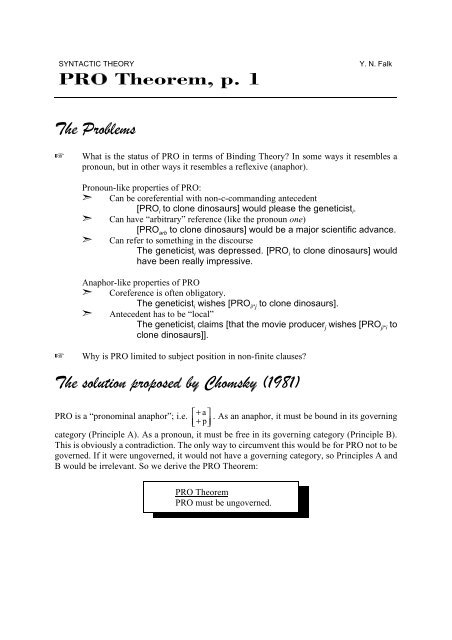
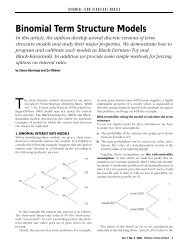
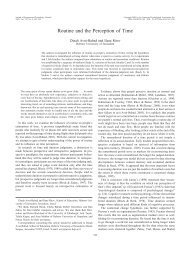
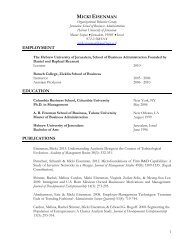
![CV [PDF] - Pluto Huji Ac Il](https://img.yumpu.com/18174585/1/190x245/cv-pdf-pluto-huji-ac-il.jpg?quality=85)
